However, to realize this policy, vocational education institutions are facing many difficult problems.
GOOD AT THE JOB BUT HARD TO TEACH IN THE CLASS
Ms. Ngo Thi Quynh Xuan, Principal of Saigon Tourism College, said that the school has many difficulties in recruiting lecturers in the culinary field. Experienced chefs and head chefs with excellent skills, even those with good teaching qualities, but do not have a university degree in the right major, do not meet the required standards for lecturers. On the contrary, many university graduates mainly work in laboratories, lack practical culinary skills, so it is difficult for them to pass on their skills to students.
This leads to a paradox: People with university degrees lack practicality, while those with practicality and teaching ability are stuck with degree requirements.
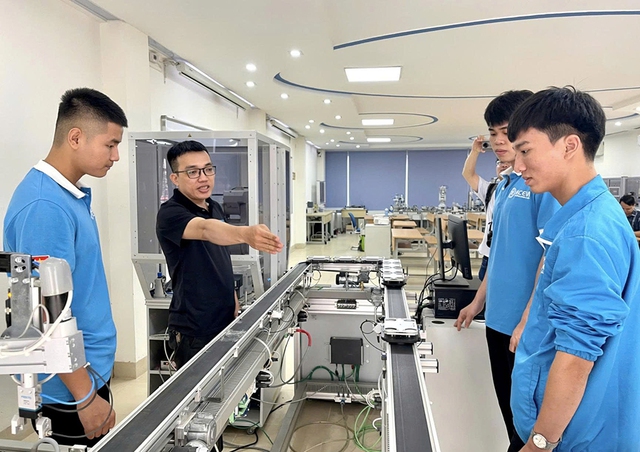
To retain good vocational lecturers, it is necessary to have a special treatment mechanism and competitive salary with businesses.
PHOTO: MY QUYEN
Therefore, the school persists in its special recruitment method of selecting people from businesses, with pedagogical qualities and a spirit of passing on the profession. Then, the school will directly train them according to the European program and require them to complete a certificate before officially teaching.
This story does not only happen in the kitchen industry. In many key fields such as precision mechanics, automotive technology, electricity - electronics, information technology, logistics, etc., schools are lacking good lecturers.
Master Lam Van Quan, Chairman of the Ho Chi Minh City Vocational Education Association, said that the rigid selection mechanism, requiring both professional skills and a teaching degree, has narrowed the pool of candidates. Meanwhile, the procedures for inviting artisans and experts from outside the society to teach are still complicated, and the remuneration is not attractive, making few people interested.
DIFFICULTIES IN POLICIES AND TREATMENT
Master Quynh Xuan believes that the salary for good lecturers is a big challenge. Master Xuan points out that many invited lecturers are people who hold high positions in businesses, such as chefs, experts... with salaries much higher than the income the school can pay. The school has tried to balance to have different treatment levels, but it is still difficult to compare with the actual income from businesses. "Their attachment to the school mainly comes from their love for the profession, respect for the school's brand and the desire to contribute to the overall development of the industry," this master added.
Some vocational training institutions have proactively introduced preferential policies to retain and develop a team of skilled lecturers. Dr. Dinh Van De, acting principal of Ly Tu Trong College (HCMC), said that the school always cares about and motivates highly qualified lecturers through perfecting policies and mechanisms on training, fostering, preferential treatment and honoring. "Master's lecturers are supported with 60 million VND/person, PhD 200 million VND, associate professors - PhD 250 million VND, professors - PhD 300 million VND. In addition, lecturers with a PhD or higher are supported with an additional 3 - 5 million VND per month, in addition to their salary and general regime," Dr. De cited.
In addition to financial policies, Ly Tu Trong College also invests in the working environment. However, Dr. De also admitted that this level of treatment is only limited to the school's internal environment.
Experts agree that to attract talented people, we must set compensation policies in relation to the labor market.
Dr. Hoang Ngoc Vinh, former Director of the Department of Vocational Education (Ministry of Education and Training), said that income in enterprises is much higher than school salaries, so retaining good vocational teachers is a big challenge. Enterprises can pay attractive salaries to attract good workers to directly participate in production, while schools find it difficult to compete in terms of income. Therefore, retaining good teachers cannot rely solely on salaries from the budget, but needs to open up a flexible mechanism.
According to Dr. Vinh, on the one hand, human resource development funds can be formed with the participation of enterprises (such as the Enterprise Training Fund according to Resolution 71); on the other hand, schools must increase income for lecturers from training services, technology transfer or production cooperation.

Many colleges invite experts to teach students.
PHOTO: YEN THI
REFORM FROM THE SELECTION STAGE
According to Master Lam Van Quan, the development of teaching staff needs to be approached according to the "career life cycle", including many stages from selection, training - fostering, career development to retention and honor.
Regarding the selection process, the source of candidates needs to be expanded, not just limited to those with pedagogical training but must boldly attract skilled workers, engineers, and artisans from businesses. The mechanism of "recruiting first - training later" is appropriate: first select skilled workers, then train them step by step to be able to teach.
Master Quan emphasized that it is necessary to build a multi-step training roadmap, similar to the German model: theory → pedagogical practice → trial teaching → evaluation. At the same time, the training content must include mandatory foreign languages, digital skills, and soft skills for lecturers to adapt to the digital transformation context. In addition, it is necessary to strengthen internship programs at enterprises and send lecturers to study abroad to update new technologies.
According to Master Quan, a clear career path also needs to be designed, from lecturer → main lecturer → training specialist. Applying the "dual lecturer" model - both teaching at school and working in enterprises is a practical solution. Along with that, it is necessary to encourage lecturers to conduct applied research, write textbooks, and participate in technology innovation projects to improve their professional capacity.
To retain talented people, it is necessary to have a special treatment mechanism and competitive remuneration with businesses. In addition to salary, it is possible to create additional allowances through cooperation with businesses, research projects or training services. At the same time, it is necessary to enhance the social status of vocational lecturers by honoring, awarding prizes and spreading their image through the media.
Dr. Hoang Ngoc Vinh emphasized that in addition to income, the educational environment, career development opportunities, social status and community respect are also important factors in retaining talented people.
Experience from abroad
Master Lam Van Quan cited that in Germany, vocational lecturers mainly come from skilled workers and engineers, and then receive pedagogical training through a multi-level roadmap. They return to businesses regularly to update new technology, forming the famous "dual lecturer" model, teaching and working at the same time.
In Korea, teachers are trained at national vocational teacher training institutes, which are attached to industrial zones. They are required to practice regularly and cannot be separated from production.
Singapore calls vocational instructors “coaches”, treats them as trainers and pays them the same as professionals in the business. The government invests heavily in training digital and soft skills, helping instructors not only teach vocational skills but also train students in working style and innovation.
Dr. Hoang Ngoc Vinh emphasized that international experience shows that in countries that have been successful in vocational education, all policies have been clearly legalized. Singapore, with its ITE (Institute of Technical Education) model, stipulates a competitive salary scale linked to skills and teaching effectiveness, and requires lecturers to periodically go to enterprises for internships, with their rights guaranteed by law. Germany has a Vocational Training Law (BBiG) that affirms the responsibilities of three parties: the State, enterprises and vocational schools. Enterprises must send highly skilled workers to participate in training, and are recognized by law as vocational instructors.
What is common is that vocational teachers in these countries are recognized for their skills, training effectiveness and recognition from the labor market - all of which have been institutionalized.
Source: https://thanhnien.vn/giu-chan-giang-vien-nghe-gioi-thach-thuc-lon-185250929162958259.htm



![[Photo] The 1st Congress of Phu Tho Provincial Party Committee, term 2025-2030](https://vphoto.vietnam.vn/thumb/1200x675/vietnam/resource/IMAGE/2025/9/30/1507da06216649bba8a1ce6251816820)
![[Photo] General Secretary To Lam, Secretary of the Central Military Commission attends the 12th Party Congress of the Army](https://vphoto.vietnam.vn/thumb/1200x675/vietnam/resource/IMAGE/2025/9/30/9b63aaa37ddb472ead84e3870a8ae825)
![[Photo] President Luong Cuong receives President of the Cuban National Assembly Esteban Lazo Hernandez](https://vphoto.vietnam.vn/thumb/1200x675/vietnam/resource/IMAGE/2025/9/30/4d38932911c24f6ea1936252bd5427fa)
![[Photo] Panorama of the cable-stayed bridge, the final bottleneck of the Ben Luc-Long Thanh expressway](https://vphoto.vietnam.vn/thumb/1200x675/vietnam/resource/IMAGE/2025/9/30/391fdf21025541d6b2f092e49a17243f)
![[Photo] Solemn opening of the 12th Military Party Congress for the 2025-2030 term](https://vphoto.vietnam.vn/thumb/1200x675/vietnam/resource/IMAGE/2025/9/30/2cd383b3130d41a1a4b5ace0d5eb989d)





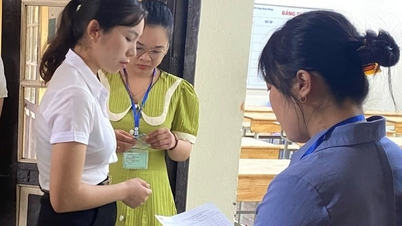



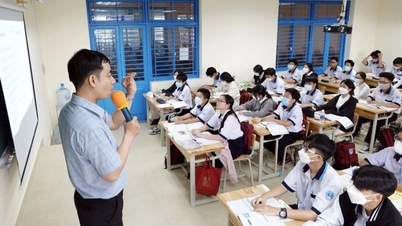




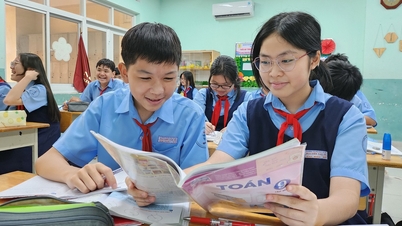

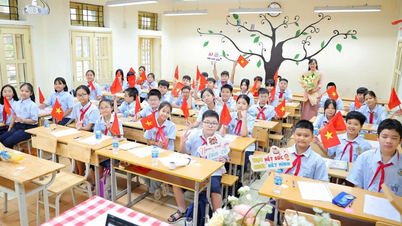









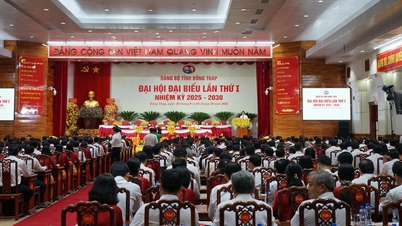




































































Comment (0)